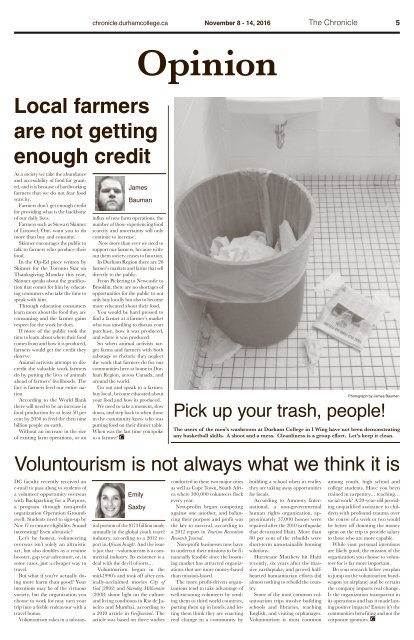You also want an ePaper? Increase the reach of your titles
YUMPU automatically turns print PDFs into web optimized ePapers that Google loves.
chronicle.durhamcollege.ca November 8 - 14, 20<strong>16</strong> The Chronicle 5<br />
Opinion<br />
Local farmers<br />
are not getting<br />
enough credit<br />
As a society we take the abundance<br />
and accessibility of food for granted,<br />
and it is because of hardworking<br />
farmers that we do not fear food<br />
scarcity.<br />
Farmers don’t get enough credit<br />
for providing what is the backbone<br />
of our daily lives.<br />
Farmers such as Stewart Skinner<br />
of Listowel, Ont. want you to do<br />
more than buy and consume.<br />
Skinner encourages the public to<br />
talk to farmers who produce their<br />
food.<br />
In the Op-Ed piece written by<br />
Skinner for the Toronto Star on<br />
Thanksgiving Monday this year,<br />
Skinner speaks about the gratification<br />
that comes for him by educating<br />
consumers who take the time to<br />
speak with him.<br />
Through education consumers<br />
learn more about the food they are<br />
consuming and the farmer gains<br />
respect for the work he does.<br />
If more of the public took the<br />
time to learn about where their food<br />
comes from and how it is produced,<br />
farmers would get the credit they<br />
deserve.<br />
Animal activists attempt to discredit<br />
the valuable work farmers<br />
do by putting the lives of animals<br />
ahead of farmers’ livelihoods. The<br />
fact is farmers feed our entire nation.<br />
According to the World Bank<br />
there will need to be an increase in<br />
food production by at least 50 per<br />
cent by 2<strong>05</strong>0 to feed the then nine<br />
billion people on earth.<br />
Without an increase in the size<br />
of existing farm operations, or an<br />
James<br />
Bauman<br />
influx of new farm operations, the<br />
number of those experiencing food<br />
scarcity and uncertainty will only<br />
continue to increase.<br />
Now more than ever we need to<br />
support our farmers, because without<br />
them society ceases to function.<br />
In Durham Region there are 20<br />
farmer’s markets and farms that sell<br />
directly to the public.<br />
From Pickering to Newcastle to<br />
Brooklin, there are no shortages of<br />
opportunities for the public to not<br />
only buy locally but also to become<br />
more educated about their food.<br />
You would be hard pressed to<br />
find a farmer at a farmer’s market<br />
who was unwilling to discuss your<br />
purchase, how it was produced,<br />
and where it was produced.<br />
So when animal activists target<br />
farms and farmers with both<br />
sabotage or rhetoric they neglect<br />
the work that farmers do for our<br />
communities here at home in Durham<br />
Region, across Canada, and<br />
around the world.<br />
Go out and speak to a farmer,<br />
buy local, become educated about<br />
your food and how its produced.<br />
We need to take a moment, slow<br />
down, and step back to when those<br />
in the community knew who was<br />
putting food on their dinner table.<br />
When was the last time you spoke<br />
to a farmer?<br />
Photograph by James Bauman<br />
Pick up your trash, people!<br />
The users of the men’s washroom at Durham College in I Wing have not been demonstrating<br />
any basketball skills. A shoot and a mess. Cleanliness is a group effort. Let’s keep it clean.<br />
Voluntourism is not always what we think it is<br />
Emily<br />
Saxby<br />
DC faculty recently received an<br />
e-mail to pass along to students of<br />
a volunteer opportunity overseas<br />
with Backpacking for a Purpose,<br />
a program through non-profit<br />
organization Operation Groundswell.<br />
Students need to sign-up by<br />
Nov <strong>17</strong> to ensure eligibility. Sound<br />
interesting? Even altruistic?<br />
Let’s be honest, volunteering<br />
overseas isn’t solely an altruistic<br />
act, but also doubles as a resume<br />
booster, gap year adventure, or, in<br />
some cases, just a cheaper way to<br />
travel.<br />
But what if you’re actually doing<br />
more harm than good? Your<br />
intentions may be of the virtuous<br />
variety, but the organization you<br />
choose to work for may turn your<br />
trip into a feeble endeavour with a<br />
travel bonus.<br />
Voluntourism rakes in a substantial<br />
portion of the $<strong>17</strong>3 billion made<br />
annually in the global youth travel<br />
industry, according to a 2012 report<br />
in African Insight. And the issue<br />
is just that—voluntourism is a commercial<br />
industry. Its existence is a<br />
deal with the devil of sorts…<br />
Voluntourism began in the<br />
mid-1990’s and took off after critically-acclaimed<br />
movies City of<br />
God (2002) and Slumdog Millionaire<br />
(2008) shone light on the culture<br />
and living conditions in Rio de Janeiro<br />
and Mumbai, according to<br />
a 2010 article in GeoJournal. The<br />
article was based on three studies<br />
conducted in these two major cities<br />
as well as Cape Town, South Africa<br />
where 300,000 volunteers flock<br />
every year.<br />
Non-profits began competing<br />
against one another, and balancing<br />
their purpose and profit was<br />
the key to survival, according to<br />
a 2012 report in Tourism Recreation<br />
Research Journal.<br />
Non-profit businesses now have<br />
to undercut their missions to be financially<br />
feasible since the booming<br />
market has attracted organizations<br />
that are more money-based<br />
than mission-based.<br />
The more profit-driven organizations<br />
tend to take advantage of<br />
well-meaning volunteers by sending<br />
them to third world countries,<br />
putting them up in hotels, and letting<br />
them think they are enacting<br />
real change in a community by<br />
building a school when in reality<br />
they are taking away opportunities<br />
for locals.<br />
According to Amnesty International,<br />
a non-governmental<br />
human rights organization, approximately<br />
37,000 homes were<br />
repaired after the 2010 earthquake<br />
that devastated Haiti. More than<br />
80 per cent of the rebuilds were<br />
short-term unsustainable housing<br />
solutions.<br />
Hurricane Matthew hit Haiti<br />
recently, six years after the massive<br />
earthquake, and proved halfhearted<br />
humanitarian efforts did<br />
almost nothing to rebuild the country.<br />
Some of the most common voluntourism<br />
trips involve building<br />
schools and libraries, teaching<br />
English, and visiting orphanages.<br />
Voluntourism is most common<br />
among youth, high school and<br />
college students. Have you been<br />
trained in carpentry… teaching…<br />
social work? A 20-year-old providing<br />
unqualified assistance to children<br />
with profound trauma over<br />
the course of a week or two would<br />
be better off donating the money<br />
spent on the trip to provide salary<br />
to those who are more capable.<br />
While your personal intentions<br />
are likely good, the mission of the<br />
organization you choose to volunteer<br />
for is far more important.<br />
Do your research before you plan<br />
to jump on the voluntourism bandwagon<br />
(or airplane) and be certain<br />
the company imparts real change.<br />
Is the organization transparent in<br />
its operations and has it made lasting<br />
positive impacts? Ensure it’s the<br />
communities benefiting and not the<br />
corporate sponsors.


















